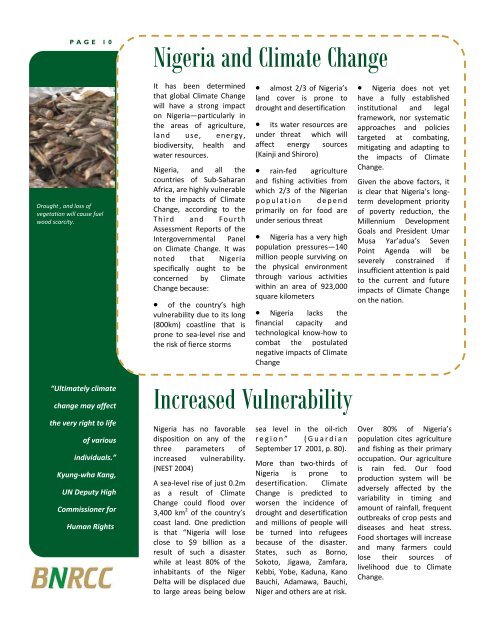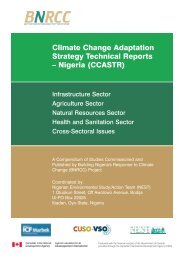PAGE 10Drought , and loss ofvegetation will cause fuelwood scarcity.Nigeria and Climate ChangeIt has been determinedthat global Climate Changewill have a strong impacton Nigeria—particularly inthe areas of agriculture,land use, energy,biodiversity, health andwater resources.Nigeria, and all thecountries of Sub‐SaharanAfrica, are highly vulnerableto the impacts of ClimateChange, according to theThird and FourthAssessment Reports of theIntergovernmental Panelon Climate Change. It wasnoted that Nigeriaspecifically ought to beconcerned by ClimateChange because:• of the country’s highvulnerability due to its long(800km) coastline that isprone to sea‐level rise andthe risk of fierce storms• almost 2/3 of Nigeria’sland cover is prone todrought and desertification• its water resources areunder threat which willaffect energy sources(Kainji and Shiroro)• rain‐fed agricultureand fishing activities fromwhich 2/3 of the Nigerianpopulation dependprimarily on for food areunder serious threat• Nigeria has a very highpopulation pressures—140million people surviving onthe physical environmentthrough various activitieswithin an area of 923,000square kilometers• Nigeria lacks thefinancial capacity andtechnological know‐how tocombat the postulatednegative impacts of ClimateChange• Nigeria does not yethave a fully establishedinstitutional and legalframework, nor systematicapproaches and policiestargeted at combating,mitigating and adapting tothe impacts of ClimateChange.Given the above factors, itis clear that Nigeria’s longtermdevelopment priorityof poverty reduction, theMillennium DevelopmentGoals and President UmarMusa Yar’adua’s SevenPoint Agenda will beseverely constrained ifinsufficient attention is paidto the current and futureimpacts of Climate Changeon the nation.“Ultimately climatechange may affectthe very right to lifeof variousindividuals.”Kyung‐wha Kang,UN Deputy HighCommissioner forHuman Rights.Increased VulnerabilityNigeria has no favorabledisposition on any of thethree parameters ofincreased vulnerability.(NEST 2004)A sea‐level rise of just 0.2mas a result of ClimateChange could flood over3,400 km 2 of the country’scoast land. One predictionis that “Nigeria will loseclose to $9 billion as aresult of such a disasterwhile at least 80% of theinhabitants of the NigerDelta will be displaced dueto large areas being belowsea level in the oil‐richregion” (GuardianSeptember 17 2001, p. 80).More than two‐thirds ofNigeria is prone todesertification. ClimateChange is predicted toworsen the incidence ofdrought and desertificationand millions of people willbe turned into refugeesbecause of the disaster.States, such as Borno,Sokoto, Jigawa, Zamfara,Kebbi, Yobe, Kaduna, KanoBauchi, Adamawa, Bauchi,Niger and others are at risk.Over 80% of Nigeria’spopulation cites agricultureand fishing as their primaryoccupation. Our agricultureis rain fed. Our foodproduction system will beadversely affected by thevariability in timing andamount of rainfall, frequentoutbreaks of crop pests anddiseases and heat stress.Food shortages will increaseand many farmers couldlose their sources oflivelihood due to ClimateChange.
<strong>BNRCC</strong> BACKGROUNDERPAGE 11Global Action on Climate ChangeGlobal action to addressClimate Change is coordinatedby the United NationsFramework Convention onClimate Change (UNFCCC). Thefirst World Climate Conferencetook place in 1979, however itwas not until September 1988that the United Nations gaveserious attention to climatechange as an issue, in responseto growing publicenvironmental awareness andconcern for the consequencesof global warming.The UN General Assembly(UNGA), at its 43 rd session in1988, adopted Resolution43/53, titled 'Protection ofglobal climate for present andfuture generations of mankind’.The resolution noted withconcern the emerging,overwhelming scientificevidence that global warmingwas a threat to establishedsocio‐economic systems.A further UNGA resolution in1990 led to the establishmentof the IntergovernmentalNegotiating Committee (INC)which, over a period of 18months, negotiated and draftedthe United Nations FrameworkConvention on Climate Change(UNFCCC) that was tabled forsignature at the United NationsConference on Environmentand Development (UNCED) inRio, Brazil, in June of 1992 (The'Rio' or 'Earth” Summit).“Global warmingis global warning!”Dr Victor Fodeke, Head, Special Climate ChangeUnit, Federal Ministry of Environment, Housingand Urban Development, Abuja, April 2008The Convention entered intoforce on March 21, 1994 andbecame an internationalagreement for all Parties thatratified it.Nigeria ratified the Conventionin August of 1994. Since then, aConference of Parties (COP)takes place annually to addressspecific Climate Change issues.The first convention took placein Berlin Germany in 1995.In December of 2007,stakeholders from all over theworld gathered in Bali for thethirteenth COP meeting.Though many perceived thatthe result was not satisfactory,progress was made in twoareas.Firstly, an agreement wasreached regarding theoperational details of theAdaptation Fund. Anindependent Adaptation FundBoard, whose membership is tobe selected by the COP, wasestablished to operationalize itsfinancial mechanism.Prior to this agreement, theAdaptation Fund was managedby the Global EnvironmentFacility (GEF), and largelyperceived to be difficult toaccess. The new administrativemechanism of the AdaptationFund is a welcome relief to thedeveloping countries, as theyno longer need to go throughthe so‐called “ImplementingAgencies” such as the WorldBank or UNEP, but canapproach the Board directly toaccess the Fund to leveragetheir adaptation activities.Secondly, COP 13 developed aRoad Map that will lead to anew global Climate Changenegotiation and treaty beyondthe first stage of commitmentsunder the Kyoto protocol whichexpires in year 2012. Thepurpose of this Road Map is tofacilitate long‐term cooperativeaction addressing climatechange. This plan would set anagenda for negotiations over aperiod of two years with thebroad objective of promotingnational and internationalgreenhouse gas mitigationprograms in both developedand developing country parties.Setting negotiation terms forboth developed and developingcountries continues to be achallenge. The complexity ofthe Climate Change issue, thediversity of nations, and anintensely political negotiatingenvironment often results inmisunderstandings, North‐South disagreements andpolitical intrigue.Consensus was reached for thedeveloped world’s track ofnegotiation, however thereremain issues of contentionwith respect to that ofdeveloping countries. Theseinclude whether “measurable,reportable and verifiabledeveloping country mitigationcommitment and action”contained in their own Articlewill be supported or not by“technology, financing andcapacity‐building by developedcountries” (Muller, 2008).“Will we watch ascatastrophicdisruption to Earth’senvironment and herpeople occurs on anunimaginable scale?Or will we changecourse and worktogether to mitigatethe effects of globalwarming?”Wangari Maathai,Kenyan NobelLaureateCOP MEETING HOSTSBerlin, Germany 1995Geneva, Switzerland 1996Kyoto, Japan 1997Buenos Aires, Argentina 1998Bonn, Germany 1999The Hague, Netherlands 2000Marrakech, Morocco 2001New Delhi, India 2002Milan, Italy 2003Buenos Aires, Argentina 2004Montreal, Canada 2005Nairobi, Kenya 2006Bali, Indonesia 2007



![Download [PDF | 6.4MB] - Building Nigeria's Response To Climate ...](https://img.yumpu.com/50509683/1/184x260/download-pdf-64mb-building-nigerias-response-to-climate-.jpg?quality=85)
![Download [PDF | 620KB] - Building Nigeria's Response To Climate ...](https://img.yumpu.com/42187836/1/184x260/download-pdf-620kb-building-nigerias-response-to-climate-.jpg?quality=85)
![Download [PDF | 3MB] - Building Nigeria's Response To Climate ...](https://img.yumpu.com/41338963/1/184x260/download-pdf-3mb-building-nigerias-response-to-climate-.jpg?quality=85)
